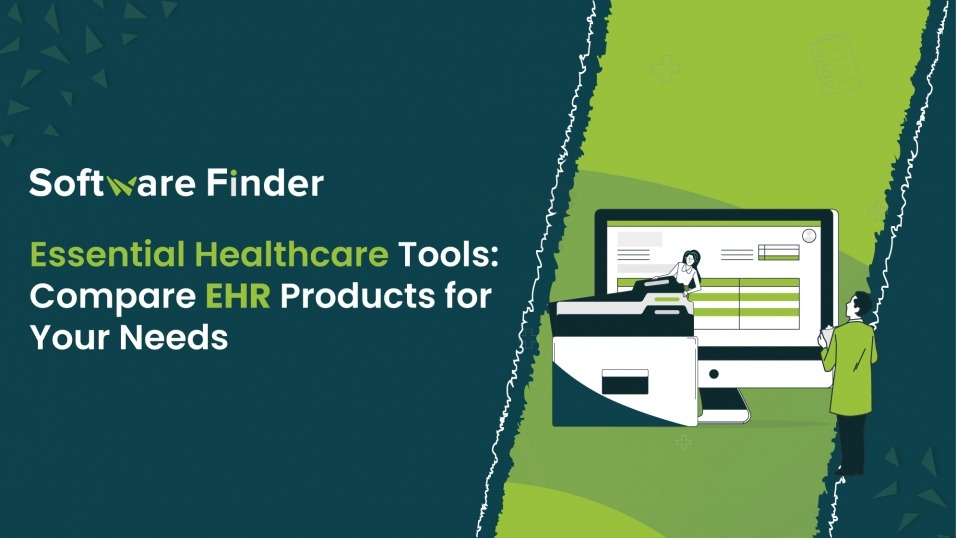
- 1. How to Choose a Compatible EHR?
- 2. Conducting Thorough EHR Analysis—How to Compare EHR Tools?
- 2.1. Specialty Type—Following Standard Protocol
- 2.2. Exploring The Budget Range—Making a Worthwhile Investment
- 2.3. Evaluating The Demo—The Cornerstone of EHR Comparisons
- 2.4. Strengths And Limitations—Assessing the Reliance
- 2.5. Top EHR Tools For You to Compare
- 2.5.1. Experity EMR—Navigating the Sails for Urgent Care
- 2.5.2. Athenahealth—Leveraging AI for Automation
- 2.5.3. eClinicalWorks—Harnessing the Synergy of Technology
- 2.5.4. AdvancedMD—Amplifying Revenue Generation
- 2.5.5. CureMD—Fostering Care Coordination
- 2.5.6. NextGen—Revolutionizing Care for Healthcare Practices
EHR solutions have revolutionized healthcare by streamlining operational workflows and enhancing patient care. However, the diversity of EHRs might leave you perplexed, making it challenging to choose the right system for your practice. This guide provides detailed insights into conducting meaningful EHR comparisons to help you assess and evaluate the products you need.
How to Choose a Compatible EHR?
When choosing an electronic health record software, you can consider things like:
Practice size: Some EHRs are designed for small practices, while others work well for large enterprises
Ease of use: The software you choose must be easy to use, offering smooth navigation.
Specialty-type: Some EHR solutions are specialty-specific, while others offer multi-specialty capabilities for complex care organizations.
Features: The feature portfolio should align well with your practice’s goals. Services like medical billing, patient portals, charting, and e-prescriptions are essential.
Financial Management: The EHR you choose must offer integrated financial management solutions, which will elevate practices' financial health by increasing revenue.
Customization: Opt for a vendor that’s loaded with endless customization as it adds value to the patient and provider experience.
Budget: Another vital factor to consider is the budget range. EHR software must be cost-effective to alleviate practices' financial burdens.
Conducting Thorough EHR Analysis—How to Compare EHR Tools?
You can compare and contrast all the products shared above to assess which offers the best value for your money. Comparing these will also help you understand which solution is more suitable for your organizational needs. Which software is more cost-effective? Which one of these aligns with your long-term goals?
Specialty Type—Following Standard Protocol
If you run a specialty-specific practice like a mental healthcare center, Therapy EMR is the best EHR for mental health private practice. It is agile, comprehensive, resilient, and packed with the specialized tools you need to excel. However, there are more suitable choices for multispecialty care centers. Athenahealth, CureMD, and Kareo are considerable options in that scenario.
Simply put, the specialty factor defines your choice for EMR in particular.
Exploring The Budget Range—Making a Worthwhile Investment
The budget range of healthcare tools like Athena EMR, CureMD, and Practice Fusion defines their worth. For this, you have to explore the price structures of EMR solutions in light of their features to decipher whether they are worth your investment.
If you have two options, Kareo and CureMD EMR, you will compare their cost bundles in terms of feature range. Kareo is known for its cost-effective bundles, offering more for less. However, CureMD charges a huge sum. Still, it is an impressive option for large organizations. On the other hand, Kareo suits scalable practices with budget limitations.
Evaluating The Demo—The Cornerstone of EHR Comparisons
Suppose you are confused about the two healthcare software programs, Experity and OmniMD, which are both known for shaping urgent care norms. Here, the demonstration tutorial comes into play. To reach a conclusion, schedule a demo with both vendors.
A comprehensive tutorial sheds light on the aim, features, and motto of EHR solutions. So, schedule one with your shortlisted vendors and take a test drive to examine their functionalities and capabilities in real-time.
Strengths And Limitations—Assessing the Reliance
Picture a practice using healthcare software but still falling down the hill. The reasons may be sluggishness, poor navigation, and ineffective communication. That’s why it is imperative to evaluate the strengths and weaknesses of EMR systems beforehand.
For instance, Epic is known for its comprehensive nature, high usability, and unprecedented capabilities, such as AI-driven analytics and patient flow management. This makes it suitable for large organizations. However, Epic's drawbacks include its steep cost and gigantic learning curve.
This illustrates that there are better fits for small practices. That’s why it is important to evaluate and compare its pros and cons.
Top EHR Tools For You to Compare
Here’s a list of comprehensive EHR tools transforming healthcare norms for effective care delivery and improved clinical productivity.
Experity EMR—Navigating the Sails for Urgent Care
Experity is the best EMR for urgent care practices. It rules the care arena with its mind-blowing clinical specs and integrated capabilities, enabling providers to deliver precise care. Experity is built to increase revenue, fuel efficiency, drive productivity, and elevate patient satisfaction.
- Why it’s great: Experity offers features like faster charting, built-in coding, and urgent care-specific workflows.
- Key features: Patient registration, billing integration, and telemedicine capabilities.
- Strengths: Streamlined patient journeys and effective claims resolution
- Limitations: Limited customization
- Best for: High-volume urgent care centers needing streamlined operations.
Athenahealth—Leveraging AI for Automation
Marking the beginning of the healthcare revolution, Athena inspired clinicians by fusing AI with clinical tools. This multi-specialty software does more than automating administrative tasks. Its exclusive voice recognition service is admirable, enabling practitioners to give undivided attention to their clients, fostering trust and enhancing care coordination.
- Why it’s great: Known for its robust cloud-based platform, Athenahealth provides real-time updates, claims management, and patient engagement tools.
- Key features: Quick check-ins, customizable templates, and analytics.
- Strengths: Sleek design, customizable interface, and simplified task management.
- Limitations: Difficult to navigate
- Best for: Urgent care clinics looking for an all-in-one EMR with billing and scheduling.
eClinicalWorks—Harnessing the Synergy of Technology
This comprehensive solution features best-in-class services for multiple specialties. Leveraging tech-savvy functionalities, eClinicalWorks streamlines patient journeys by nurturing effective engagement and tracking patient vitals. It also features one of the best mobile apps to ensure seamless care delivery.
- Why it’s great: Offers comprehensive tools for charting, documentation, and patient engagement while being cost-effective.
- Key features: Telehealth integration, patient portal, and AI-driven clinical tools.
- Strengths: Secure communication channels and scalable technology
- Limitations: Customization may be limited
- Best for: Clinics prioritizing digital transformation and patient outreach.
AdvancedMD—Amplifying Revenue Generation
Known especially for its billing capabilities, AdvancedMD holds an untarnished reputation in the care realm. From alleviating administrative burdens to automating clinical operations, it offers many unparalleled functionalities. AdvancedMD’s RCM module has a separate fan base because it quickly amplifies revenue generation, improving practices' financial health.
- Why it’s great: Highly customizable with tools for urgent care workflows like patient tracking and automated check-ins.
- Key features: Mobile capabilities, customizable forms, and robust analytics.
- Strengths: Simplified billing and seamless clinical workflows
- Limitations: Complex billing module for small practices
- Best for: Clinics with specific customization needs.
CureMD—Fostering Care Coordination
CureMD is second to none. This multispecialty platform grows as practices grow, helping clients embrace scalability. It nurtures care coordination by incorporating patient-centric services, promising secure communication and data transparency. Understanding practices' unique needs allows for seamless customization to enhance clinical productivity and efficiency.
- Why it’s great: Affordable and user-friendly, CureMD is ideal for small-to-medium urgent care centers.
- Key features: Integrated billing, cloud hosting, and scheduling.
- Strengths: User-friendly design and thorough customer support
- Limitations: Pricing transparency issues
- Best for: Cost-conscious clinics seeking simplicity.
NextGen—Revolutionizing Care for Healthcare Practices
Harnessing the synergy of technological innovation, NexGen features next-level features to revolutionize care practices. It assesses the clinical needs and evaluates patient concerns, satisfying both parties simultaneously to attain healthier outcomes. It allows for enhanced care precision, features interoperability, and offers third-party integrations.
- Why it’s great: Specialty-specific templates, affordability.
- Key Features:
- Strengths:
- Limitations: Learning curve for new users.
- Best for: Practices focusing on specialties like pediatrics or cardiology.
We hope this guide will provide you with thorough insights, allowing you to compare the EHR platforms and make an informed decision. You may opt for any other healthcare software that meets your practice's needs and requirements. We are rooting for you.


